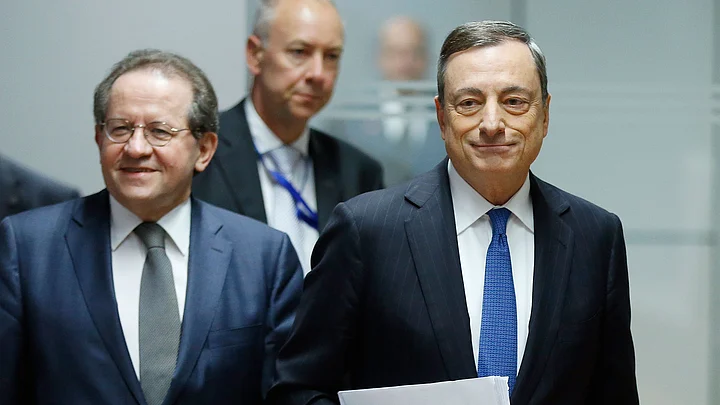The European Central Bank cut a key interest rate on Thursday and announced an extension of its monthly asset purchases. But the euro leapt higher as financial markets signalled they had been expecting yet more stimulus.
Delving deeper into the bank’s monetary toolbox, ECB chief Mario Draghi said the bank would not only include euro-denominated regional and local debt in its purchases but would also look to reinvest principal payments in the scheme.
“This will contribute both to favourable liquidity conditions and to an appropriate monetary policy stance,” Draghi told a news conference.
He said the ECB did not add to its monthly asset purchase programme because extending the scheme and reinvesting proceeds were deemed sufficient.
Draghi said the quantitative easing asset-buying programme would continue “until the end of March 2017 or beyond if necessary”, he added, spelling out that the central bank’s priority of hitting a medium-term target of inflation at just under two per cent.
It had been due to end around September 2016. Earlier the bank cut its deposit rate to -0.3 percent from its existing -0.2 percent, effectively charging banks more for parking cash with the central bank, reversing its earlier guidance that rates had bottomed out.
But the euro hit a four-week high of $1.0894, over two per cent up on the day, and the pan-European FTSEurofirst 300 fell deeper into negative territory in a sign financial markets had been expecting Draghi to provide more stimulus.
Bear in mind that Super Mario has accustomed market participants to surpass their lofty expectations.Stephane Ekolo, Chief European Strategist, Market Securities
Draghi stressed that risks to the world economy and to the inflation outlook remained skewed to the downside and added that he did not rule out the use of other instruments if needed.
With inflation running near zero and likely to miss the bank’s target of nearly two per cent for years to come, the ECB had all but committed to action. The bank’s governing council had also been expected to have discussed more extreme ideas, possibly a two-tier deposit rate that would punish banks parking too much cash with the central bank or the purchase of municipal and corporate debt.
But many of those proposals were seen meeting resistance within the council. Critics of easing, led by the Governing Council’s two German members, argue that monetary policy is already exceptionally loose and the biggest reason inflation is hovering near zero is the fall in oil prices, which is a boost for growth as lower energy costs leave households with more to spend.
The US Federal Reserve’s expected interest rate hike this month also complicates ECB action. Fed Chair Janet Yellen said on Wednesday she was “looking forward” to a US interest rate rise but an unexpectedly weak manufacturing survey this week has also raised fresh doubts about the Fed’s rate path.
Indeed, business activity in the euro zone picked up at its fastest pace since mid-2011 last month, third quarter economic growth was running at a respectable 1.6 percent and lending is increasing at the quickest rate in four years.
(At The Quint, we question everything. Play an active role in shaping our journalism by becoming a member today.)
